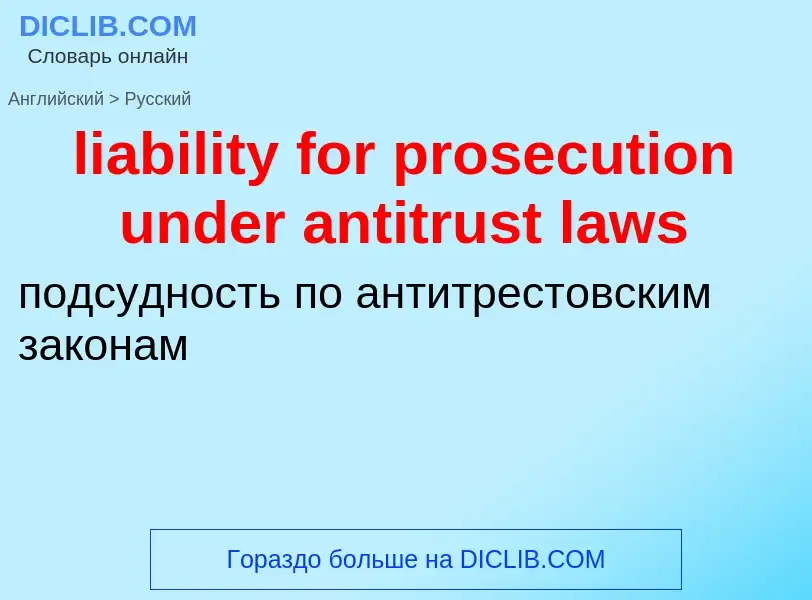Μετάφραση και ανάλυση λέξεων από την τεχνητή νοημοσύνη ChatGPT
Σε αυτήν τη σελίδα μπορείτε να λάβετε μια λεπτομερή ανάλυση μιας λέξης ή μιας φράσης, η οποία δημιουργήθηκε χρησιμοποιώντας το ChatGPT, την καλύτερη τεχνολογία τεχνητής νοημοσύνης μέχρι σήμερα:
- πώς χρησιμοποιείται η λέξη
- συχνότητα χρήσης
- χρησιμοποιείται πιο συχνά στον προφορικό ή γραπτό λόγο
- επιλογές μετάφρασης λέξεων
- παραδείγματα χρήσης (πολλές φράσεις με μετάφραση)
- ετυμολογία
liability for prosecution under antitrust laws - translation to ρωσικά
Ορισμός

Βικιπαίδεια

In the United States, antitrust law is a collection of mostly federal laws that regulate the conduct and organization of businesses to promote competition and prevent unjustified monopolies. The three main U.S. antitrust statutes are the Sherman Act of 1890, the Clayton Act of 1914, and the Federal Trade Commission Act of 1914. These acts serve three major functions. First, Section 1 of the Sherman Act prohibits price fixing and the operation of cartels, and prohibits other collusive practices that unreasonably restrain trade. Second, Section 7 of the Clayton Act restricts the mergers and acquisitions of organizations that may substantially lessen competition or tend to create a monopoly. Third, Section 2 of the Sherman Act prohibits monopolization.
Federal antitrust laws provide for both civil and criminal enforcement. Civil antitrust enforcement occurs through lawsuits filed by the Federal Trade Commission, the United States Department of Justice Antitrust Division, and private parties who have been harmed by an antitrust violation. Criminal antitrust enforcement is done only by the Justice Department's Antitrust Division. Additionally, U.S. state governments may also enforce their own antitrust laws, which mostly mirror federal antitrust laws, regarding commerce occurring solely within their own state's borders.
The scope of antitrust laws, and the degree to which they should interfere in an enterprise's freedom to conduct business, or to protect smaller businesses, communities and consumers, are strongly debated. Some economists argue that antitrust laws actually impede competition, and may discourage businesses from pursuing activities that would be beneficial to society. One view suggests that antitrust laws should focus solely on the benefits to consumers and overall efficiency, while a broad range of legal and economic theory sees the role of antitrust laws as also controlling economic power in the public interest. A survey of 568 member economists of the American Economic Association (AEA) in 2011 found a near-universal consensus, in that 87 percent of respondents broadly agreed with the statement "Antitrust laws should be enforced vigorously."


![ATF]] explicitly states in its 1923 manual that its goal is to 'discourage unhealthy competition' in the printing industry. ATF]] explicitly states in its 1923 manual that its goal is to 'discourage unhealthy competition' in the printing industry.](https://commons.wikimedia.org/wiki/Special:FilePath/ATF policy.jpg?width=200)
![[[Federal Trade Commission]] building, view from southeast [[Federal Trade Commission]] building, view from southeast](https://commons.wikimedia.org/wiki/Special:FilePath/ApexBuildingHighsmith.jpg?width=200)
![[[Standard Oil]] (Refinery No. 1 in [[Cleveland]], [[Ohio]], pictured) was a major company broken up under United States antitrust laws. [[Standard Oil]] (Refinery No. 1 in [[Cleveland]], [[Ohio]], pictured) was a major company broken up under United States antitrust laws.](https://commons.wikimedia.org/wiki/Special:FilePath/Standard Oil.jpg?width=200)
![Department of Justice]] in [[Washington, D.C.]] is the public enforcer of [[antitrust]] law. Department of Justice]] in [[Washington, D.C.]] is the public enforcer of [[antitrust]] law.](https://commons.wikimedia.org/wiki/Special:FilePath/U.S. Department of Justice headquarters, August 12, 2006.jpg?width=200)
![Since 1922 the courts and Congress have left [[Major League Baseball]], as played at [[Chicago]]'s [[Wrigley Field]], unrestrained by antitrust laws. Since 1922 the courts and Congress have left [[Major League Baseball]], as played at [[Chicago]]'s [[Wrigley Field]], unrestrained by antitrust laws.](https://commons.wikimedia.org/wiki/Special:FilePath/Wrigley field 720.jpg?width=200)
![[[Scottish Enlightenment]] philosopher [[Adam Smith]] was an early enemy of cartels. [[Scottish Enlightenment]] philosopher [[Adam Smith]] was an early enemy of cartels.](https://commons.wikimedia.org/wiki/Special:FilePath/AdamSmith.jpg?width=200)
![Coke]] in the 17th century thought that general restraints on trade were unreasonable. Coke]] in the 17th century thought that general restraints on trade were unreasonable.](https://commons.wikimedia.org/wiki/Special:FilePath/Edward coke.jpg?width=200)
![Elizabeth I assured monopolies would not be abused in the early era of [[globalization]]. Elizabeth I assured monopolies would not be abused in the early era of [[globalization]].](https://commons.wikimedia.org/wiki/Special:FilePath/Elizabeth I (Armada Portrait).jpg?width=200)
![[[John Stuart Mill]] believed the [[restraint of trade]] doctrine was justified to preserve [[liberty]] and [[competition]]. [[John Stuart Mill]] believed the [[restraint of trade]] doctrine was justified to preserve [[liberty]] and [[competition]].](https://commons.wikimedia.org/wiki/Special:FilePath/John-stuart-mill-sized.jpg?width=200)
![[[Paul Samuelson]], author of the 20th century's most successful economics text, combined mathematical models and [[Keynesian]] macroeconomic intervention. He advocated the general success of the market but backed the American government's antitrust policies. [[Paul Samuelson]], author of the 20th century's most successful economics text, combined mathematical models and [[Keynesian]] macroeconomic intervention. He advocated the general success of the market but backed the American government's antitrust policies.](https://commons.wikimedia.org/wiki/Special:FilePath/Paul Samuelson.gif?width=200)
![[[Robert Bork]] [[Robert Bork]]](https://commons.wikimedia.org/wiki/Special:FilePath/Robert Bork.jpg?width=200)
![Senatorial Round House by [[Thomas Nast]], 1886 Senatorial Round House by [[Thomas Nast]], 1886](https://commons.wikimedia.org/wiki/Special:FilePath/Senatorial Round House by Thomas Nast 1886.jpg?width=200)
